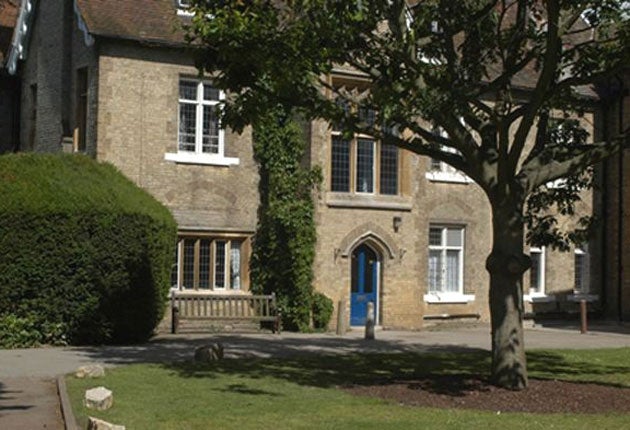School that does not do A-levels tops league table
Comprehensive thrives as pupils rise to challenge of international baccalaureate

A school which no longer teaches A-levels has topped this year's league table of A-level results from state comprehensives.
Hockerill Anglo-European School in Bishop's Stortford, Hertfordshire, which ditched A-level courses in favour of the International Baccalaureate (IB) exam, managed to get 60 per cent of its pupils into elite universities.
The IB is considered to offer sixth-form students a broader curriculum than A-levels. They must take seven compulsory subjects including science, maths, English and languages, and write an extended essay to stretch their creative thinking skills.
As well as topping the list of non-selective schools, Hockerill also came second overall in the league table of secondary schools in England and Wales, beating 163 grammars and about 2,800 comprehensives.
This year, all 79 of its baccalaureate students passed their exams, giving it a pass rate way above the 80 per cent international average. "Sixty per cent of Hockerill's students have achieved places at Russell Group universities, the group which represents 20 of the country's most research intensive universities including Oxford and Cambridge," the school said in a statement.
Hockerill, which accepts boarders and day pupils aged 11 to 19, and has many students from overseas whose families are based in the UK, also bucked a national trend which has seen a fall in the number of sixth-formers studying modern foreign languages.
"Forty per cent of our students achieved bilingual diplomas including 'mother tongue' fluency in at least two languages," the school said.
The leading grammar school in the league table was Colchester Royal in Essex. Its 145 A-level students scored an average of 572 points per candidate – equivalent to at least four grade-A passes and an AS-level.
"In terms of our point score, it is slightly up on this time last year," said the headteacher, Keith Jenkinson. "What is pleasing from the school's point of view is that we have kept up a consistently high standard. Most of the pupils are going to university."
Mr Jenkinson said he backed the introduction of the new A* grade at A-level next year because it would help universities to differentiate between the thousands of applicants who were expected to get three straight passes at grade A.
Mr Jenkinson, whose school selects boys aged 11 to 18 and accepts girls in the sixth form, added: "I'm a supporter of the A* to see how we differentiate between the different candidates."
Despite claims in some political circles that A-levels have been "dumbed down", the efforts of this year's candidates were praised by teaching unions and industrialists. Susan Anderson, of the Confederation of British Industry, said: "Employers value and understand A-levels and know they reflect real ability and hard work."
Miles Templeman, director-general of the Institute of Directors, said there was a debate to be had over whether A-levels could be changed to better prepare young people for the world of further education and employment, but added: "Important as those issues are, now is not the time for that debate."
He said it was especially pleasing to see an increase in the take-up of maths and science this summer.
Join our commenting forum
Join thought-provoking conversations, follow other Independent readers and see their replies
Comments
Bookmark popover
Removed from bookmarks